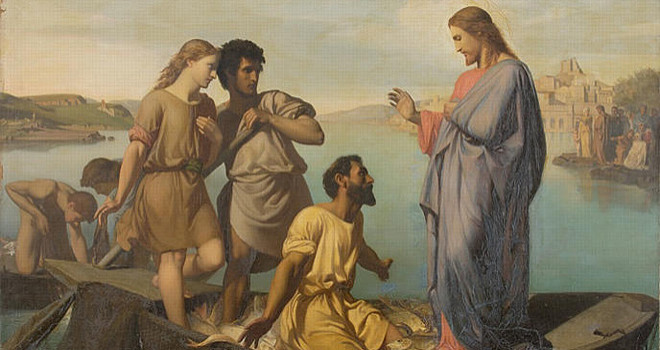Msgr. Charles Pope: On the Sufferings of St. Paul and the Price of the Gospel
May 17, 2019The Coming Civil War Over Abortion, by Michael Brown
May 17, 2019
By Fr. George W. Rutler, Crisis Magazine, May 17, 2019
 “I welcome you on the eve of a great battle.” So began General Dwight D. Eisenhower on May 15, 1944 solemnly addressing the admirals and generals and officers of the Allied Expeditionary Force, announcing the proposed strategy for Operation Overlord, codename for the Normandy invasion. Underestimated as an orator, Eisenhower’s speech riveted the attention of all in the tense atmosphere. The location was an unlikely one: a lecture hall of Saint Paul’s School in London. The boys had already been evacuated to Berkshire during the Blitz. The top brass, who had arrived from the advance command post of the Supreme Headquarters of the Allied Forces at Southwick House in Hampshire, were seated on school chairs, with two armchairs occupied by King George VI and Prime Minister Winston Churchill. Then General Bernard Montgomery, the future Field Marshall, brought out his maps to show the British and American positions. The school served as headquarters of the XXI Army Group under Montgomery, and he felt at home there because he was an Old Pauline. Now he could take the place of his old Headmaster, or High Master as was the title used from the day of the school’s foundation in 1509 by John Colet.
“I welcome you on the eve of a great battle.” So began General Dwight D. Eisenhower on May 15, 1944 solemnly addressing the admirals and generals and officers of the Allied Expeditionary Force, announcing the proposed strategy for Operation Overlord, codename for the Normandy invasion. Underestimated as an orator, Eisenhower’s speech riveted the attention of all in the tense atmosphere. The location was an unlikely one: a lecture hall of Saint Paul’s School in London. The boys had already been evacuated to Berkshire during the Blitz. The top brass, who had arrived from the advance command post of the Supreme Headquarters of the Allied Forces at Southwick House in Hampshire, were seated on school chairs, with two armchairs occupied by King George VI and Prime Minister Winston Churchill. Then General Bernard Montgomery, the future Field Marshall, brought out his maps to show the British and American positions. The school served as headquarters of the XXI Army Group under Montgomery, and he felt at home there because he was an Old Pauline. Now he could take the place of his old Headmaster, or High Master as was the title used from the day of the school’s foundation in 1509 by John Colet.
As a close friend of Erasmus, and even closer as spiritual advisor to Thomas More, Colet was the epitome of a Renaissance humanist, laden with learning he brought back from France and Italy to lecture in his own university at Oxford. More lured him back to his birthplace of London where his father had been a rich merchant and twice Lord Mayor. As Dean of Saint Paul’s cathedral, he put his reforming principles to work with eloquent imprecations against the pride, concupiscence, covetousness, and worldly absorptions that had tainted the priesthood. Archbishop Warham of Canterbury dismissed frivolous charges of heresy brought against him by offended clerics, and his combination of charm and audacity engendered the respect even of Henry VIII, despite his bold preaching against the king’s French wars. As a priest with no children of his own, and no nieces or nephews because all twenty-two of his siblings had died in childhood, Colet devoted much of his inherited fortune to founding Saint Paul’s school for teaching 153 boys literature, manners, and, with Renaissance flair, Greek on a par with Latin. Erasmus said that when Colet lectured he thought he was hearing a second Plato. But if so, his Platonism was Christian. He wanted a great catch, like the 153 fish that the apostles had hauled in at the command of the Risen Christ. The boys would be welcome “from all nations and countries indifferently.”
The catch was great indeed and since then the school has turned out graduates including, just for starters: John Milton, Samuel Pepys, John Churchill, G.K. Chesterton, three holders of the Victoria Cross, and the astronomer for whom Halley’s comet is named. And all rising from the first 153… Read the re article:  crisismagazine.com/2019/a-great-catch-the-153-fish
crisismagazine.com/2019/a-great-catch-the-153-fish




